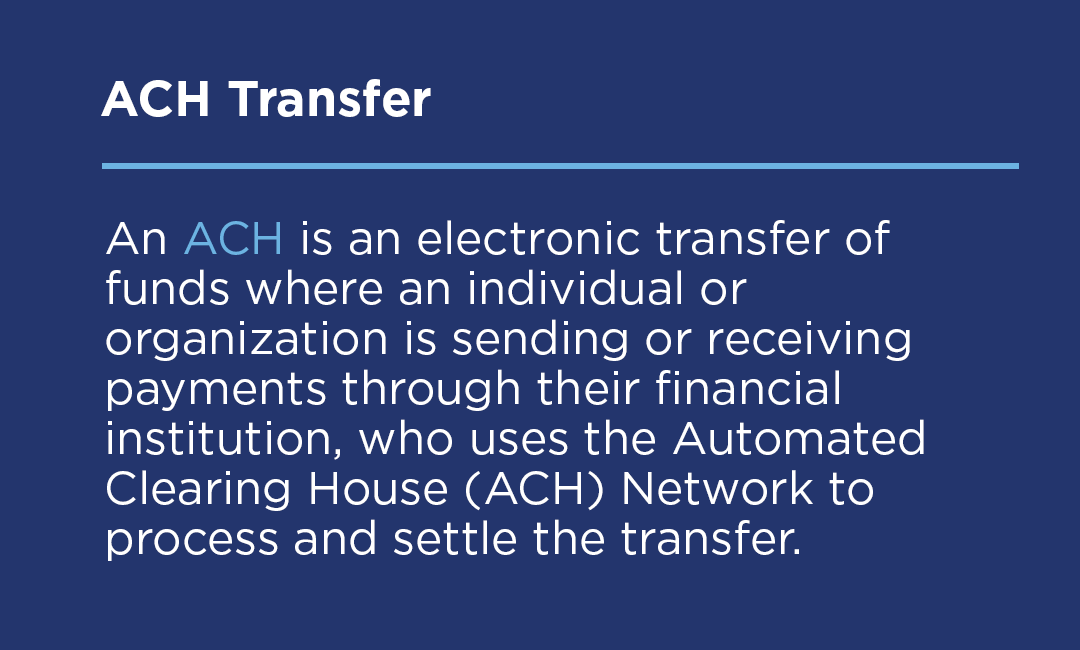Traditional checks are scarce these days as money primarily changes hands through electronic transfers typically initiated via online or mobile banking. For example, transferring money from your checking account into your savings account no longer means writing a check to yourself, taking it to your local branch or ATM to deposit and waiting for your financial institution to move the funds from one account to the other. Today, you simply initiate a transfer online or via your mobile device and the money moves instantly from one of your accounts to another.
A wire transfer is another example in which money moves electronically. In this case, it goes from one person or entity’s account to another, usually when a large amount of money needs to be moved quickly and securely, such as to make a down payment at a mortgage closing.
Then, there are ACH transfers. Whether you know what an ACH is or not, you’ve almost certainly been a party to one. So, let’s explore what they are and how they work.
What are ACH transfers?
An ACH is an electronic transfer of funds where an individual or organization is sending or receiving payments through their financial institution, who uses the Automated Clearing House (ACH) Network to process and settle the transfer. This makes the ACH network, which is managed by the National Automated Clearing House Association (Nacha), the engine behind the direct deposits and direct payments that you likely use on a regular basis.

In years past, ACH transfers took an average of one to three days to complete. Although financial institutions typically don’t charge a fee for ACH transfers, some banks and credit unions place limits on ACH dollar amounts or the number allowed during a certain timeframe.
In 2016, Nacha introduced Same Day ACH transfers. As their name implies, they are processed on the same day they are initiated if the request is made by the financial institution’s daily cutoff time. The availability of Same Day ACHs has grown significantly since their debut, in large part to help financial institutions compete with the rise of financial technology apps that can move money quicker than traditional ACHs.
What are examples of ACH transfers?
According to Nacha, in the 1970s, the Social Security Administration was one of the first to use the ACH network to transfer social security payments in the form of direct deposits into recipients’ bank or credit union accounts. Today, public, private and governmental organizations use ACH transfers to direct deposit money for a variety of reasons, such as the following:
- Employers paying their employees
- Employers contributing to employee benefits, such as 401(k) retirement accounts and health savings accounts
- The IRS and states issuing tax refunds
- Insurance companies making annuity payments
- Pension and retirement funds paying out income
- Veterans Affairs issuing benefits
- Investments paying dividends
Likewise, individuals and organizations can set up ACH direct payments to take care of one-time or recurring bills or contributions through their institution’s automated bill pay feature. Many businesses have payment portals where you can also set up direct payments, although some only accept credit cards on them. Remember to always ensure that your account and routing information is accurate, or the ACH payment can possibly be returned.
Here are everyday uses for ACH direct payments:
- Mortgage and rent payments
- Utility bills
- Insurance premiums
- Car payments
- Deposits into IRA, brokerage or college savings accounts
It’s worth noting that even when you use checks today, many merchants convert them to ACH transfers because they are easier and cheaper to process than physical checks. The business simply uses the key details on the check—the routing number, account number and check serial number—to initiate the ACH transfer.
Why are some ACH transfers and direct deposits available early?
Workers who receive their paycheck via direct deposit may have noticed in the last few years that deposits can arrive up to two days earlier than the scheduled pay date. This is because most financial institutions receive payroll information from employers two days ahead of time, thus enabling them to push the funds out before they clear, understanding that the funds are en route. (Quorum participates in this “Early Direct Deposit” service, meaning if you have a Quorum checking or savings account that receives a direct deposit, it will post to your account up to two days early!*)
Can you use an ACH for a person-to-person (P2P) transfer?
When you are part of an ACH transfer, you need to share your checking or savings account number with the other party. It’s never wise to share this information with another individual, which is why person-to-person (P2P) ACHs are not common.
Transferring money to a friend or family member P2P payment app, such as Zelle®, a creation of the largest U.S. financial institutions. It allows you to transfer money electronically safely and quickly to an account at any U.S. bank or credit union without the other person seeing your account information. Many institutions (including Quorum), now offer Zelle® directly through their mobile banking apps. Venmo and PayPal are other P2P payment options. [Remember to only transfer money to known friends and family; read here for important safety tips.]
Why are ACH transfers so popular?
In 2022 alone, more than 30 billion transfers totaling almost $77 trillion went through the ACH network. There are several reasons why ACH transfers are preferable to paper checks for parties on both sides of the transaction:
- They take much less time and effort to initiate and process.
- The money reaches its destination much faster.
- There is no need to order checks, buy stamps or pay people to manually process the transaction.
- They leave an electronic trail to help people and businesses track their income and expenses.
Additionally, when you pay your bills via ACH direct payments, the money comes directly out of your checking or savings account rather than going on your credit card. This helps keep your balances from spiraling out of control, especially if you’re already struggling with too much credit card debt.
For most people, the best thing about ACH transfers is having their paycheck automatically deposited into the checking or savings account of their choice.
*Early availability is not guaranteed and may vary from deposit to deposit. Funds availability depends on when we receive the payor’s payment instructions, any limitations we set on the amount of early availability, and standard fraud prevention screening. Eligible deposits are electronic deposits made through the Automated Clearing House (ACH) to your personal account including but not limited to items such as your payroll, pension, and government benefit payments. Other deposits or credits to your account, such as deposits of funds from person-to-person payment services (e.g., Zelle®, Venmo, or PayPal transfers), check or mobile deposits, and other online transfers or electronic credits are not eligible for early availability.






Comments Section
Please note: Comments are not monitored for member servicing inquiries and will not be published. If you have a question or comment about a Quorum product or account, please visit quorumfcu.org to submit a query with our Member Service Team. Thank you.